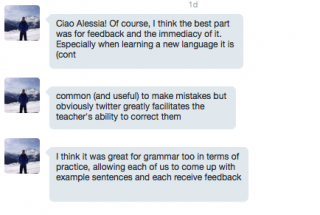-
Recent Posts
- Preparations underway for 25th EuroCALL conference to be held at Southampton 24/02/2017
- The student experience on an online Pre-sessional Course for international students 10/06/2016
- Promoting German language and culture online: the SoGerman blog 11/05/2016
- A research study investigating the student experience on the MA in English Language Teaching: Online 03/03/2016
- S4B: A new Blended Learning module for students of Business 25/01/2016
- Using Quizlet, a vocabulary learning app, with Ab-Initio students of Italian 14/12/2015
- ‘SmartSkills’ and ‘Protonomy’: scaffolding the start of a transition to learner autonomy in a blended learning environment by encouraging Independent Learning and pro-active autonomy 13/11/2015
- A case study exploring the evolution of one online course design 14/09/2015
- TwitTIAMO! Using Twitter with Italian beginners to help develop cultural awareness and communicative language skills 30/06/2015
- Modern Languages eLearning Group blog launched! 23/06/2015
Archives
Calendar
April 2024 M T W T F S S 1 2 3 4 5 6 7 8 9 10 11 12 13 14 15 16 17 18 19 20 21 22 23 24 25 26 27 28 29 30
Tag Archives: Italian
Using Quizlet, a vocabulary learning app, with Ab-Initio students of Italian
This month’s blogpost is by Bianca Belgiorno, Teaching Fellow in Italian in the Department of Modern Languages:
The challenge of learning new vocabulary in a foreign language in a short period of time can be difficult. This can be particularly so during the first part of an Ab-Initio course when the students are asked to learn many words and expressions to help them start communicating in class in the new language and to practise what they have learned.
To help my students learn new Italian vocabulary I have been using an app called Quizlet. These are vocabulary flash cards that the students can use with their mobile devices or computer. These aide-memoires (available in many languages) include audio (although sound quality can be a bit metallic) to help students learn correct pronunciation. There are different games that can be played with the same set of cards. I created different sets of flash cards linked with topics covered in class and I added the links to the VLE, Blackboard. Students can also create their own sets of cards to share.
Although the Quizlet app is designed to use in the simplest way with target and students’ first language on either side, see this example, I have been experimenting with these Flash cards in different ways. Here are some examples:
• infinitives of Italian verbs vs. Italian Present tense
• sentences in Italian (with missing preposition vs. complete sentences – basically gap-fill tasks)
They can be added as links to Blackboard and it’s possible to group sets of flash cards for one specific class, allowing students to see all the topics covered in class. These can be used for revision purposes. The app is free unless images are required. Where permission is given, it is also possible to copy sets of cards published by others and then customise / edit them. My students’ feedback has been very positive; many say that this way of learning vocabulary is not as daunting as learning from lists. In class, I see students continue to use the app as their vocabulary improves. Students’ usage can also be tracked through a function in the Quizlet app itself.
The author is happy to be contacted for further information: bba1y07@soton.ac.uk
Posted in Uncategorized
TwitTIAMO! Using Twitter with Italian beginners to help develop cultural awareness and communicative language skills
 Our first blogpost is by Alessia Plutino, Teaching Fellow in Italian in the Department of Modern Languages:
Our first blogpost is by Alessia Plutino, Teaching Fellow in Italian in the Department of Modern Languages:
The pedagogical research project “TwitTIAMO” started in 2013 and is still in use with students of Italian at the University of Southampton to investigate student engagement, cultural awareness and communicative language skills development using the 140-character word limit that is the main feature of microblogging with Twitter.
TwitTIAMO has involved 20 to 30 able linguist students each year from our Italian Accelerated 1+2 Course. This is a fast-paced course for able linguists who pick up Italian from scratch. It allows for just four x 45 minute teaching periods a week, in which there is little time for anything else but language learning! Students expressed a desire for intercultural knowledge to be more integrated into their curriculum and this request had to match my aim, as tutor, for ‘active’ student learning and interaction in the target language outside classroom hours to help prepare them for their oral exam (role play in set scenario).
I found the perfect solution in Twitter, as it mimics the quick succession of comments in a normal conversation, requiring both quick thinking skills and spontaneity. A class Twitter account was set up, with student followers. The tutor acted as guide, suggesting linguistic structures learnt in class for students to mimic and expand creatively. Topics came up spontaneously deriving from students’ interests, and students also surfed the internet, used online vocabulary sources etc., sharing links and pictures and taking charge of their own learning.
The results so far have been very positive, suggesting that:
- Twitter can help develop fluency in written and oral skills;
- Students can learn how to focus on what they say better (they can only use 140 characters)
- Through tweeting themselves, tutors can differentiate and help to reinforce what they have introduced in their classrooms
- Discussions are more interactive and swift and can also add to metacognitive development, i.e. reflective learning.
(List adapted from Ritchie’s 2009 article in the Times Education Supplement)
Here is some student feedback on TwitTIAMO (using Twitter of course!):

You can read more about Alessia’s successful project on the Languages at Southampton blog. You can also see a video of Alessia talking about the project on her page on the ILIaD website.
Posted in Uncategorized








